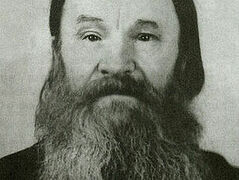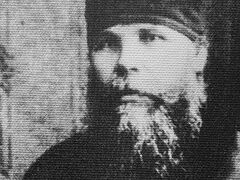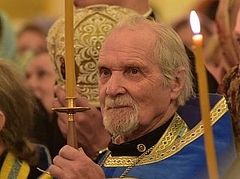 The church in the village of Reshetniki. Photo: sobory.ru
The church in the village of Reshetniki. Photo: sobory.ru
—Did you decide to study at a theological seminary right after the army?
—After the army I returned to the church, which was dear to me, in the village of Reshetniki. The priest was delighted. He said, “We didn’t expect to see you again.” Such was anti-religious propaganda. He blessed me to enter the seminary. With his blessing I wrote an application for admission to the Moscow Theological Seminary, took the envelope to the post office and received a receipt, but the letter was never sent. During Khrushchev’s persecution of the Church such things were common. But I didn’t realize all this at the time and awaited an answer. By the beginning of August nothing had been received from the seminary, so I decided to go there.
I approached the secretary and was told that they had received no letter from me, and the secretary hinted that it was useless to send documents by mail. He gave me the contacts of Pyotr Dosayev, who then worked as a caretaker at the Holy Trinity-St. Sergius Lavra and lived in Moscow. I met him, and Dosayev agreed to help me. He suggested sending the documents to him, and he himself would hand them over to the seminary (as it turned out, he had helped many people with the transfer of documents before me so as to avoid mail and special services). However, I had already lost a year. I went to work in Reshetniki again.
Next year I came back to the seminary.
—How were your entrance exams?
—The inspector, Igumen Philaret (Vakhromeyev) spoke with me. I told him that since school I had performed the obedience as a singer and a reader in church and that my grandfather had suffered for his faith. He reported all this to the seminary’s secretary, Archpriest Alexei Ostapov (his father was the secretary of Patriarch Alexei I). At the entrance exams I was asked to sing “Lord I Have Cried”, tone 3. Next, they asked me about the spiritual meaning of the feast of the Transfiguration of the Lord. I began to tell them that before His Passion the Lord had taken His disciples with Him and was transfigured on Mount Tabor—He had shown His Glory. Glory is a Divine Power. In short, it wasn’t an exam in the traditional sense. The seminary took into account my experience of serving in the church as a reader and a singer, and I was admitted.
—When were you ordained?
—In 1965, during my third year at the seminary, I was ordained deacon on the autumn feast of St. Sergius of Radonezh; and in the fourth year on the winter feast of St. Nicholas, I became a priest. But it wasn’t me who wanted it that way: the Lord arranged everything thanks to many people I have already spoken about, and, of course, thanks to the inspector, Fr. Philaret (later he became Metropolitan of Minsk and Belarus), who noticed that I, an ordinary rural church caretaker, had a great desire to study at a theological seminary.
After my ordination I was invited to a service of Patriarch Alexei I. He awarded me the epigonation.1 During our conversation he recalled how the faithful had suffered in Solovki and reminded me of the words that a newly ordained priest is told when a piece of consecrated Lamb is placed in his hands with an exhortation: “Receive this pledge, and preserve it whole and unharmed until thy last breath, because thou shalt be held to account therefore in the Second and Dread Coming of our Great Lord, God, and Savior, Jesus Christ.” That is, the Body of Christ is placed in the priest’s hands—this pledge is great. And priests will give account for this vow. Therefore, a priest, even if he is rebuked and mocked, has no right to raise his hand against anyone.
 Pioneers at the Holy Trinity-St. Sergius Lavra, which was turned into a museum after the revolution. Photo: rg.ru
Pioneers at the Holy Trinity-St. Sergius Lavra, which was turned into a museum after the revolution. Photo: rg.ru
—What else stuck in your mind during your studies at the seminary?
—Persecutions. They shouted at us, “You parasites, we’ll close your churches! Get out of here!” Soviet Komsomol members campaigned against us—it was a terrible time. Archimandrite Tikhon (Agrikov) served at the Holy Trinity-St. Sergius Lavra. What he had to endure! How he was mocked! Even half–naked women jumped onto him from the upper floor to make everybody think: “Look what a priest is doing.” There were all kinds of provocations. But he, a man of high spiritual life, did not react to such things, and still he was expelled from the academy and from the Lavra. For many years he was persecuted, living in Ukraine and in Abkhazia. He suffered much.
—If you were ordained during your seminary years, it means that you got married in the same period. Where did you meet your wife? After all, the theological seminary is a closed educational institution.
—My wife, Lyubov, was a spiritual daughter of Archimandrite Tikhon (Agrikov). My acquaintance, Fr. Simeon Mitrofanov, introduced me to her. He asked me, “When will you get married”? And I said, “I don’t have a fiancée.” And he answered, “I have someone to introduce you to—Lyubov Mikhailovna who goes to Fr. Tikhon for confessions.” She worked as a kindergarten teacher in Moscow and travelled to the Holy Trinity-St. Sergius Lavra to her father-confessor. We met and immediately liked each other. We got married in summer on the feast of the Kazan Icon.
 Archimandrite Tikhon (Agrikov) —How did you end up in the land of Vyatka again?
Archimandrite Tikhon (Agrikov) —How did you end up in the land of Vyatka again?
—After graduating from the seminary, I was sent to the Kirov Diocese. Vladyka John assigned me to serve at St. Seraphim’s Cathedral, where I have served ever since. On my arrival there was no place for me to stay, let alone an apartment to live in. There was an annex in the church area, where the caretaker Dmitry Ivanovich served; he sheltered me under the roof in the hayloft. My wife and our little son were living in Moscow with our son’s godmother at that time. And I began my priestly ministry. Not being the rector, I could not come to terms with some of the irregularities at the church. I began to insist that intercession lists submitted by parishioners should be read immediately at the nearest services and not put into boxes. I also spoke out about Gospel readings: now the Holy Gospel is read throughout Lent, but previously it was read only on Holy Week. Some supported my proposals and “reforms”, while others were not happy with them and were opposed to me. But I continued to serve as a priest in the parish.
—You began your pastoral ministry in the 1960s—the period of Khrushchev’s persecutions. What was the spiritual life in the land of Vyatka like at that time? What were trials that fell on the shoulders of believers in Kirov?
—It was a tough time. For any word or action in support of the Church you could be given a prison term. Father Seraphim Isupov had a relative named Vasily Vasilyevich, a parishioner of the church. He made two side chapels in the church. The church had to be enlarged—there were a lot of people and it was cramped. For this he was summoned to the authorities and told, “Either work in the church or leave.” However, his trials did not end there. He was imprisoned for two years for rebuilding the church. At the same time, all his property was confiscated. After the end of his term he returned to the city and worked at the church as a caretaker for the rest of his life. He would pray all day long and read the Gospel at night. In a word, he did not leave the church and was a true believer.
—Who supported you in difficult times? Your wife, parishioners?
—Vasily Vasilyevich once addressed the congregation: “Father Simeon serves here, but he has nowhere to live, and his family is in another city.” And the parishioner Anna Mikhailovna of blessed memory who lived with other women in the church house gave me her small room and herself moved to the kitchen of a communal apartment. Can you imagine that? Of course, we were very grateful to her.
But there were trials even there: the space was tiny and cramped, at night our children were bitten by bedbugs crawling out from under the wallpaper. My wife supported me in these trials and was always with me. Over time, the Lord sorted things out.
—Commissioners in the Soviet era—who were they?
—These were people from government agencies who watched how clergy lived, what they said in their sermons, how they served. They could urge the bishop, “This one should be removed and that one should be transferred there.” Surely, they kept an eye on me, especially since not everyone liked the zeal in the church and the “reforms” in the parish that I proposed. But I did not violate the Soviet laws—I carried out my priestly ministry conscientiously. It also happened that KGB officers asked us to spy on the parishioners and inform on them (and almost the whole city attended St. Seraphim’s Church), but my fellow clergy and I remembered the consecrated Lamb and were faithful to our service to the Church. Once I was even threatened with a gun; they tried to force me to sign a blank sheet—but in vain. I had already been warned in advance in Urzhum by Father Simeon Garkavtsev, who had gone through labor camps, “Semyonushka, they will trouble you again, so be wise.” I did not sign anything under any threats.
—Have you served at St. Seraphim’s Church in Kirov all your life?
—As a cleric of this church, yes. But on the great feasts—for example, Pascha, I travelled to celebrate services in other cities and towns of the Kirov region: Urzhum, Kirs, Omutninsk, Lalsk… There was a prayer house in Omutninsk. We had to start from the minimum, because in the Soviet era everywhere we were met by dilapidated churches, there were no priests locally, so it was not easy to celebrate services. There weren’t even elementary things, but at the same time believers always rejoiced when the priest arrived and gathered for services, especially on the major feasts. All the parishioners were happy to try and do something for the church. Each place had its own customs and traditions.
 St. Seraphim’s Cathedral in Kirov
St. Seraphim’s Cathedral in Kirov
—Who attended church services?
—Old women and young people, believers and even non-believers. Sometimes some young people were present in the church, although not for prayer, but in order to record which of the other young people went to pray.
—Tell us about the most remarkable Pascha in your life.
—I remember that since my childhood I had always felt great joy on this feast. As we sang Paschal hymns, the soul rejoiced. When I was celebrating services in Sinai, on Mt. Tabor on the feast of the Transfiguration, when I was in Jerusalem, I experienced the same Paschal joy.
But another Pascha was imprinted on my memory as well. I remember how in the late 1970s, on Paschal night in Kirov, stones with celluloid “smoke bombs” were flung at us. Then there was the Paschal procession from St. Seraphim’s Cathedral, and we were literally stoned. During the service a stone flew through the window and fell on the altar table. Hooligans also tried to cause panic among the faithful in the church, throwing “smoke bombs” into the crowd shouting: “Fire!” They took plastic combs, wrapped them up in paper and set them on fire. There was a lot of acrid smoke. They hoped to create panic in this way and drive the faithful out of the church. So atheistically minded young people engaged in hooliganism. Both the authorities and the police allowed it. We had to survive that time.
—What do you particularly remember from the years of perestroika and the “crazy 1990s”?
—Freedom of religion appeared. In the 1990s I became the rector. We tried to maintain the church in good order, washed the walls, painted and built a lot. Churches in the city (and throughout the country) were reopening, and during the years of perestroika more believers started coming to services.
At that time I visited Jerusalem, thereby fulfilling not only my dream, but also the dream of my grandfather Sergei. I commemorated him during my pilgrimage to the Holy City. Thank God that in our time it has become possible to visit these holy sites. I had a chance to serve on Mt. Sinai and on Mt. Tabor. In ten days I had time to take the most of that trip. I remembered that event for the rest of my life. Back then such pilgrimages were organized only by the Patriarchate, and these were pilgrimages, not tourist trips, as they are now. Everything was spiritual, prayerful, though financially unsettled.
—Who are spiritually stronger: believers of the Soviet past or modern laypeople?
—Believers of the Soviet era were stronger in faith, now people are weaker and more pampered. Difficulties hardened us and strengthened us in the faith.
—Please give spiritual advice to those who want to embark on the path of pastoral ministry.
—Have humility, meekness, abstinence, patience, love for the church and services, be zealous for worship, read the Holy Scriptures and be nourished by them.
—What would you wish our readers?
—Christ is Risen—and we will all be resurrected. The Lord promised—and He will fulfill His promises. Through illnesses, sorrows and suffering the Lord cleanses the human soul and brings it closer to Himself. The Lord came to free us from sin. Every day you should read the Gospel, absorbing every word of it—this is a conversation with Christ Himself. Let us remember the Savior’s words:
Abide in Me, and I in you. As the branch cannot bear fruit of itself, except it abide in the vine; no more can ye, except ye abide in Me. I am the vine, ye are the branches: He that abideth in Me, and I in him, the same bringeth forth much fruit: for without Me ye can do nothing (Jn. 15:4-5).



